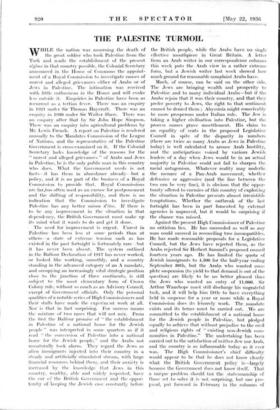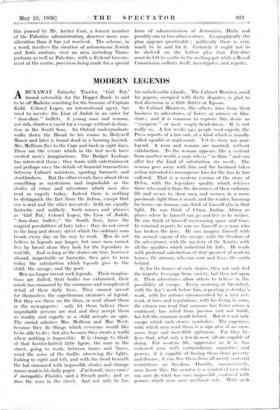THE PALESTINE TURMOIL W HILE the nation was mourning the death
of the great soldier who took Palestine from the Turk and made the establishment of the present regime in that country possible, the Colonial Secretary announced in the House of Commons the appoint- ment of a Royal Commission to investigate causes of unrest and alleged grievances either of Arabs or of Jews in Palestine. The intimation was received with little enthusiasm in the House and will evoke less outside it. Enquiries in Palestine have been as recurrent as a tertian fever. There was an enquiry in 1921 under Sir Thomas Haycraft. There was an enquiry in 1930 under Sir Walter Shaw. There was an enquiry after that by Sir John Hope Simpson.
There was an enquiry into agricultural problems by Mr. Lewis French. A report on Palestine is rendered annually to the Mandates Commission of the League of Nations, and the representative of the Palestine Government is cross-examined on it. If the Colonial Secretary lacks knowledge of the reasons for the " unrest and alleged grievances " of Arabs and Jews in Palestine, he is the only public man in this country who does. What the Government needs is not facts—it has them in abundance already—but a policy, and it is no part of the business of a Royal Commission to provide that. Royal Commissions are far.too often used as an excuse for postponement and the shifting of responsibility, and there is no indication that the Commission to investigate Palestine has any better raison d'etre. If there is to be any improvement in the situation in that dependency, the British Government must make up its mind what it wants to do and get it done.
The need for improvement is urgent. Unrest in Palestine has been less at some periods than at others—a state of extreme tension such as has existed in the past fortnight is fortunately rare—but it has never been absent. The system outlined in the Balfour Declaration of 1917 has never worked, or looked like working, Smoothly, and a country standing in the advanced category of an A mandate, and occupying an increasingly vital strategic pOsition close to the junction of three continents, is still subject to the most elementary form of Crown Colony rule, without so much as an Advisory Council, except of Government officials. Only the personal qualities of a notable series of High Commissioners and their staffs have made the experim:mt work at all.
Nor is that in fact surprising. For success means the mixture of two races that will not mix. FrOm the first the Balfour promise of " the establishMent in Palestine of a national home for the JeWish people " was interpreted in some quarters as if it read " the conversion of Palestine into a national home for the Jewish people," and the Arabs not unnaturally took alarm. They regard the Jews as alien immigrants injected into their country in a steady and artificially stimulated stream, with large financial resources behind them, and their anxiety is increased by the knowledge that Jews. in this country, wealthy, able and widely . respected, have the ear of the British Government and, the oppor- tunity 'of keeping the Jewish case constantly before the British people, while the Arabs have no single effective mouthpiece in Great Britain. A letter from an Arab writer in our correspondence columns this week puts the Arab view in a rather extreme form, but a Jewish writer last week showed how much ground for reasonable complaint Arabs have.
Much, of course, can be said on the other side. The Jews are bringing wealth and prosperity to Palestine and to many individual ArabsbUt if the Arabs rejoin that it was their country, and that they prefer poverty to Jews, the right to that sentiment cannot be denied them ; Abyssinia might conceivably be more prosperous under Italian rule. The Jew is taking a higher civilisation into Palestine, but the process causes grave unsettlement. His claim to an equality of seats in the proposed Legislative Council in spite of the disparity in 'nunibeis (there are twice as many Arabs as Jews in Palestine today) is well calculated to arouse Arab hostility, and the anticipations voiced by various Jewish leaders of a day when Jews would be in an actual majority in Palestine could not fail to sharpen the racial antagonism. Whatever reality may underlie the menace of a Pan-Arab movement, ivhether defensive or aggressive (and the line between the two can be very- fine), it is obvious that the"oppor- tunity offered to enemies of this country of eXploiting the situation in Palestine presents almost irresistible temptations. Whether the. outbreak of ' the last fortnight has been in part fomented by external • . • agencies is unproved, but it would be surprising if the chance was missed. . Against the present High Commissioner of Palestine no criticism lies. He has succeeded as well as any man could succeed in reconciling two incompatibles. He has made reasonable proposals for a Legislative Council, but the Jews have rejected them, as the Arabs rejected Sir Herbert Samuel's proposed. council fourteen years ago. He has limited the ,quota of Jewish immigrants to 4,500 for the half-year. ending September 30th, but the Araks who wanted com- plete suspension (to yield to that demand is out of the question) are likely to be no better pleased than the Jews who wanted an entry of 11,000._ Sir Arthur Wauchope must still discharge his ungrateful task, and it will help him little to haVe everything held in suspense for a year or more while a Royal Commission does its leisurely work. The.. mandate exists and its terms must be carried out. _:t We are committed to the establishment of .a national home for the Jewish people in Palestine, but, pledged equally to achieve. that without prejudice to the civil and religious rights of " existing. non-Jewish com- munities in Palestine." The undertaking has been carried out to the satisfaction of neither Jew nor Arab, and the country is as inflammable today as it ever was. The High Commissioner's chief difficulty would appear to be that he does not. know clearly what the British Government; policy is—largely because the Government does, not know itself. That a unique problem should tax t4e..§tatesmanship of those set to solve it, is not. surprising, but one pro- posal, put forward in February in the columns of this journal by Mr. Archer Cust, a former member of the Palestine administration,. deserves- more con- sideration than it has yet received. The scheme, in a word, involves the creation of autonomous Jewish and Arab eantons, over an area including Trans- jordania as well as Palestine, with a Federal Govern- ment at the centre, provision being made for a special form of administration at Jerusalem, Haifa and possibly one or two other centres. Geographically the plan appears practicable ; politically there is very much to be said for it. Certainly it ought not to be shelved on the hollow plea that Palestine must be left to seethe in the melting-pot while a Royal Commission collects itself, investigates and reports.



















































 Previous page
Previous page